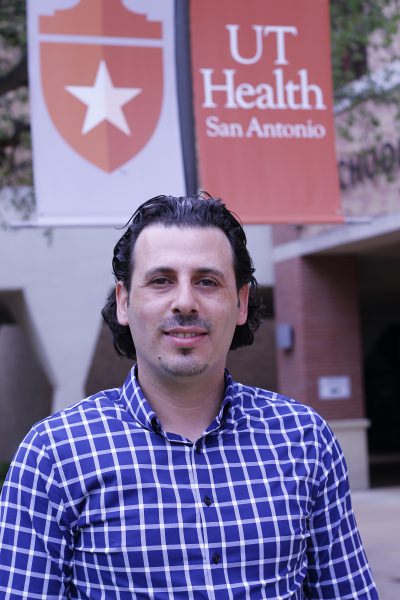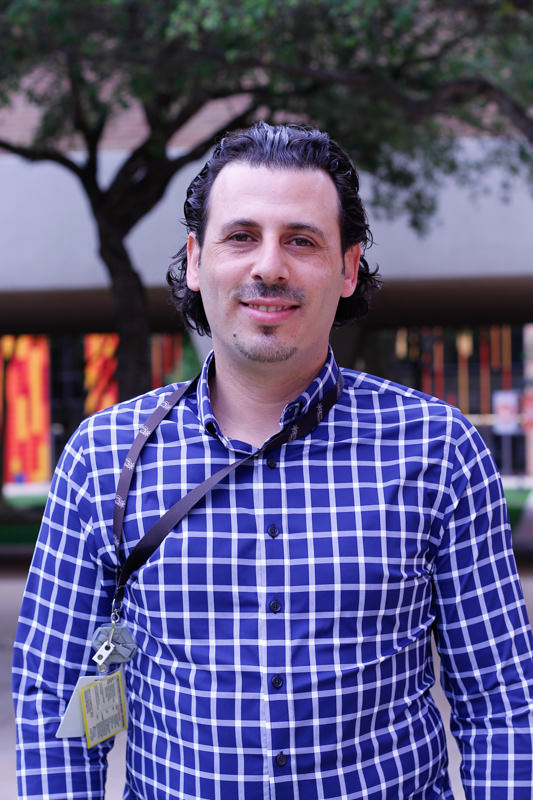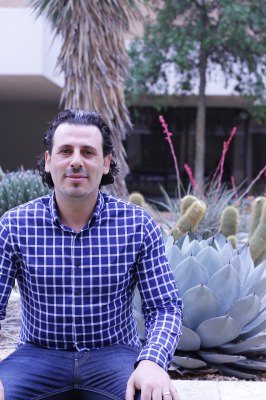Mohammad Obeidat: I’ve Watched More Than 30 SPURS Games
 1) Your name, program, mentor name.
1) Your name, program, mentor name.
Mohammad Obeidat, Ph.D. in Radiological Sciences – Radiotherapy track, Neil Kirby, Ph.D.
2) When did you realize you were passionate about science?
10th grade – because of my physics teacher
3) Please tell me about yourself, why did you pick UT Health Science Center, and your program.
I was born and raised in Amman, Jordan. I am 35 years old, married to Sally and have a stepson (Ivan). I joined the department in Spring 2014 (January) after receiving a full grant from the ministry of higher education in Jordan.
I picked the program for the following reasons:
– The program is Commission on Accreditation of Medical Physics Education Programs (CAMPEP) accredited.
– The school rank and reputation.
– The weather in Texas.
– I am a SPURS fan (picked San Antonio over South Korea and Canada).
– I have family in Houston.
– I was destined to meet Sally here haha
4) Tell me about your research. Why are you passionate about your research topic? How did you first become interested in it?
My research is about developing a novel dosimeter which measures the DNA double-strand break following a radiation dose for the purpose of dosimetry. This dosimeter could provide a more biologically relevant measure of radiation damage than the currently utilized dosimeters as none of them directly measures the biological effect of radiation dose.
I became interested in this project because of my mentor Dr. Neil Kirby. Since the first research meeting we made to discuss research ideas I believed that this project will be the next big thing in Medical Physics as it will improve both our understanding of radiation damage and the life quality of patients. My passion to Biology beside physics and the great idea of Dr. Kirby was the spark. The coprincipal investigators of this project are Dr. Neil Kirby and Dr. Eun Yong Shim. I was blessed to be an effective member of this great project with my colleague Kristen McConnell!
 5) What do you want the public to know about your research? Why is your topic important?
5) What do you want the public to know about your research? Why is your topic important?
This project can really improve the radiotherapy measurements especially for the small field size dosimetry. This can improve the precision of dose calculation for these fields which will improve the life quality of patients.
Also, this dosimeter is a better representation for the biological damage following radiation than all other commercially available dosimeters.
6) What was your best memory during graduate school or what did you learn?
– The jokes, walks, and talks with my doctors and colleagues at UT Health San Antonio’s Cancer Center.
– The times I spent at the SeaWorld and Riverwalk.
– Watching more than 30 SPURS games.
– Being one of the ten finalists in John R. Cameron Young Investigator Symposium American Association of Physicists in Medicine national meeting, Washington DC, 2016.
– Meeting my wife Sally.
– Having a great stepson – Ivan.
– Welcoming my newborn nephew – Hashim
– Having many friends here in San Antonio.
 7) What do you like to do outside of graduate school?
7) What do you like to do outside of graduate school?
Outside of graduate school, I like to play table tennis, soccer, watch movies and hang out with my friends and family.
8) What’s next?
On July 1st, I will start my residency here at UT Health San Antonio’s Cancer Center. The length of the residency program is 2 years and it focus on improving my clinical training.
